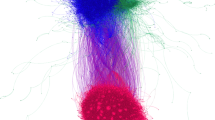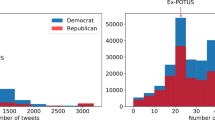Abstract
Through the use of Twitter, framing has become a prominent presidential campaign tool for politically active users. Framing is used to influence thoughts by evoking a particular perspective on an event. In this paper, we show that the COVID19 pandemic rather than being viewed as a public health issue, political rhetoric surrounding it is mostly shaped through a blame frame (blame Trump, China, or conspiracies) and a support frame (support candidates) backing the agenda of Republican and Democratic users in the lead up to the 2020 presidential campaign. We elucidate the divergences between supporters of both parties on Twitter via the use of frames. Additionally, we show how framing is used to positively or negatively reinforce users’ thoughts. We look at how Twitter can efficiently be used to identify frames for topics through a reproducible pipeline.
This paper was accepted at SocInfo2020. Please cite the SocInfo version.
Access this chapter
Tax calculation will be finalised at checkout
Purchases are for personal use only
Similar content being viewed by others
Notes
- 1.
GOP: Grand Old Party; DNC: Democratic National Committee.
References
Abu-Jbara, A., King, B., Diab, M., Radev, D.: Identifying opinion subgroups in Arabic online discussions. In: Proceedings of the 51st Annual Meeting of the Association for Computational Linguistics (Volume 2: Short Papers), pp. 829–835 (2013)
Aldayel, A., Magdy, W.: Your stance is exposed! Analysing possible factors for stance detection on social media. In: Proceedings of the ACM on Human-Computer Interaction, vol. 3, no. CSCW, pp. 1–20 (2019)
Bakliwal, A., Foster, J., van der Puil, J., O’Brien, R., Tounsi, L., Hughes, M.: Sentiment analysis of political tweets: towards an accurate classifier. In: Proceedings of the Workshop on Language Analysis in Social Media, pp. 49–58. Association for Computational Linguistics, Atlanta, June 2013. https://www.aclweb.org/anthology/W13-1106
Baumer, E., Elovic, E., Qin, Y., Polletta, F., Gay, G.: Testing and comparing computational approaches for identifying the language of framing in political news. In: Proceedings of the 2015 Conference of the North American Chapter of the Association for Computational Linguistics: Human Language Technologies, pp. 1472–1482 (2015)
Bermingham, A., Smeaton, A.: On using Twitter to monitor political sentiment and predict election results. In: Proceedings of the Workshop on Sentiment Analysis where AI meets Psychology (SAAIP 2011), pp. 2–10. Asian Federation of Natural Language Processing, Chiang Mai, November 2011. https://www.aclweb.org/anthology/W11-3702
Borge-Holthoefer, J., Magdy, W., Darwish, K., Weber, I.: Content and network dynamics behind Egyptian political polarization on twitter. In: Proceedings of the 18th ACM Conference on Computer Supported Cooperative Work & Social Computing, pp. 700–711. ACM (2015)
Burch, L., Frederick, E., Pegoraro, A.: Kissing in the carnage: an examination of framing on twitter during the vancouver riots. J. Broadcast. Electron. Media 59, 399–415 (2015). https://doi.org/10.1080/08838151.2015.1054999
Card, D., Boydstun, A., Gross, J.H., Resnik, P., Smith, N.A.: The media frames corpus: annotations of frames across issues. In: Proceedings of the 53rd Annual Meeting of the Association for Computational Linguistics and the 7th International Joint Conference on Natural Language Processing (Volume 2: Short Papers), pp. 438–444 (2015)
Choi, E., Tan, C., Lee, L., Danescu-Niculescu-Mizil, C., Spindel, J.: Hedge detection as a lens on framing in the GMO debates: a position paper. In: Proceedings of the Workshop on Extra-Propositional Aspects of Meaning in Computational Linguistics, pp. 70–79. Association for Computational Linguistics, Jeju, July 2012. https://www.aclweb.org/anthology/W12-3809
Chong, D., Druckman, J.N.: Framing theory. Annu. Rev. Polit. Sci. 10, 103–126 (2007)
Conover, M., Ratkiewicz, J., Francisco, M.R., Gonçalves, B., Menczer, F., Flammini, A.: Political polarization on Twitter. ICWSM 133, 89–96 (2011)
Darwish, K.: To kavanaugh or not to kavanaugh: that is the polarizing question. arXiv preprint arXiv:1810.06687 (2018)
Darwish, K., Stefanov, P., Aupetit, M.J., Nakov, P.: Unsupervised user stance detection on twitter. arXiv preprint arXiv:1904.02000 (2019)
Djemili, S., Longhi, J., Marinica, C., Kotzinos, D., Sarfati, G.E.: What does twitter have to say about ideology? In: NLP 4 CMC: Natural Language Processing for Computer-Mediated Communication/Social Media-Pre-conference Workshop at Konvens 2014, vol. 1, p. http-www. Universitätsverlag Hildesheim (2014)
Ebrahimi, J., Dou, D., Lowd, D.: A joint sentiment-target-stance model for stance classification in tweets. In: Proceedings of COLING 2016, the 26th International Conference on Computational Linguistics: Technical Papers, pp. 2656–2665 (2016)
Entman, R.M.: Framing: toward clarification of a fractured paradigm. J. Commun. 43(4), 51–58 (1993)
Fulgoni, D., Carpenter, J., Ungar, L., Preoţiuc-Pietro, D.: An empirical exploration of moral foundations theory in partisan news sources. In: Proceedings of the Tenth International Conference on Language Resources and Evaluation (LREC 2016), pp. 3730–3736. European Language Resources Association (ELRA), Portorož, Slovenia, May 2016. https://www.aclweb.org/anthology/L16-1591
Gerrish, S., Blei, D.M.: How they vote: Issue-adjusted models of legislative behavior. In: Pereira, F., Burges, C.J.C., Bottou, L., Weinberger, K.Q. (eds.) Advances in Neural Information Processing Systems, vol. 25, pp. 2753–2761. Curran Associates, Inc. (2012). http://papers.nips.cc/paper/4715-how-they-vote-issue-adjusted-models-of-legislative-behavior.pdf
Greene, S., Resnik, P.: More than words: syntactic packaging and implicit sentiment. In: Proceedings of Human Language Technologies: The 2009 Annual Conference of the North American Chapter of the Association for Computational Linguistics, pp. 503–511. Association for Computational Linguistics, Boulder, June 2009. https://www.aclweb.org/anthology/N09-1057
Groshek, J., Al-Rawi, A.: Public sentiment and critical framing in social media content during the 2012 U.S. presidential campaign. Soc. Sci. Comput. Rev. 31, 563–576 (2013). https://doi.org/10.1177/0894439313490401
Harlow, S., Johnson, T.: The arab spring—overthrowing the protest paradigm? How the new york times, global voices and twitter covered the Egyptian revolution. Int. J. Commun. 5 (2011). https://ijoc.org/index.php/ijoc/article/view/1239
Hasan, K.S., Ng, V.: Why are you taking this stance? Identifying and classifying reasons in ideological debates. In: Proceedings of the 2014 Conference on Empirical Methods in Natural Language Processing (EMNLP), pp. 751–762 (2014)
Ishizaki, S., Kaufer, D.: The docuscope text analysis and visualization environment. In: McCarthy, P., Boonthum, C. (eds.) Invited Chapter for Applied Natural Language Processing and Content Analysis: Identification, Investigation, and Resolution (2011)
Johnson, K., Goldwasser, D.: Identifying stance by analyzing political discourse on twitter. In: Proceedings of the First Workshop on NLP and Computational Social Science, pp. 66–75 (2016)
Johnson, K., Jin, D., Goldwasser, D.: Modeling of political discourse framing on Twitter. In: Eleventh International AAAI Conference on Web and Social Media (2017)
Johnson, K., Lee, I.T., Goldwasser, D.: Ideological phrase indicators for classification of political discourse framing on Twitter. In: Proceedings of the Second Workshop on NLP and Computational Social Science, pp. 90–99. Association for Computational Linguistics, Vancouver, August 2017. https://doi.org/10.18653/v1/W17-2913. https://www.aclweb.org/anthology/W17-2913
Jones Jang, M., Hart, P.: Polarized frames on “climate change” and “global warming” across countries and states: evidence from Twitter big data. Glob. Environ. Change 32, 11–17 (2015). https://doi.org/10.1016/j.gloenvcha.2015.02.010
Kaufer, D., Butler, B.: Rhetoric and the Arts of Design. Routledge, Abingdon (1996)
Kaufer, D., Butler, B.: Designing Interactive Worlds with Words: Principles of Writing as Representational Composition. Routledge, Abingdon (2000)
Nelson, T.E., Oxley, Z.M., Clawson, R.A.: Toward a psychology of framing effects. Polit. Behav. 19(3), 221–246 (1997)
Pla, F., Hurtado, L.F.: Political tendency identification in Twitter using sentiment analysis techniques. In: Proceedings of COLING 2014, the 25th International Conference on Computational Linguistics: Technical Papers, pp. 183–192. Dublin City University and Association for Computational Linguistics, Dublin, August 2014. https://www.aclweb.org/anthology/C14-1019
Pond, P., Lewis, J.: Riots and Twitter: connective politics, social media and framing discourses in the digital public sphere. Inf. Commun. Soc. 22(2), 213–231 (2019). https://doi.org/10.1080/1369118X.2017.1366539
Recasens, M., Danescu-Niculescu-Mizil, C., Jurafsky, D.: Linguistic models for analyzing and detecting biased language. In: Proceedings of the 51st Annual Meeting of the Association for Computational Linguistics (Volume 1: Long Papers), pp. 1650–1659. Association for Computational Linguistics, Sofia, August 2013. https://www.aclweb.org/anthology/P13-1162
Sim, Y., Acree, B.D.L., Gross, J.H., Smith, N.A.: Measuring ideological proportions in political speeches. In: Proceedings of the 2013 Conference on Empirical Methods in Natural Language Processing, pp. 91–101. Association for Computational Linguistics, Seattle, Washington, October 2013. https://www.aclweb.org/anthology/D13-1010
Sridhar, D., Foulds, J., Huang, B., Getoor, L., Walker, M.: Joint models of disagreement and stance in online debate. In: Proceedings of the 53rd Annual Meeting of the Association for Computational Linguistics and the 7th International Joint Conference on Natural Language Processing (Volume 1: Long Papers), pp. 116–125 (2015)
Stefanov, P., Darwish, K., Atanasov, A., Nakov, P.: Predicting the topical stance and political leaning of media using tweets. In: ACL 2020 (2020)
Tan, C., Lee, L., Pang, B.: The effect of wording on message propagation: topic- and author-controlled natural experiments on Twitter. In: Proceedings of the 52nd Annual Meeting of the Association for Computational Linguistics (Volume 1: Long Papers), pp. 175–185. Association for Computational Linguistics, Baltimore, June 2014. https://doi.org/10.3115/v1/P14-1017. https://www.aclweb.org/anthology/P14-1017
Walker, M.A., Anand, P., Abbott, R., Grant, R.: Stance classification using dialogic properties of persuasion. In: Proceedings of the 2012 Conference of the North American Chapter of the Association for Computational Linguistics: Human Language Technologies, pp. 592–596. Association for Computational Linguistics (2012)
Wiebe, J., Wilson, T., Bruce, R., Bell, M., Martin, M.: Learning subjective language. Comput. Linguist. 30(3), 277–308 (2004). https://doi.org/10.1162/0891201041850885
Author information
Authors and Affiliations
Corresponding author
Editor information
Editors and Affiliations
Rights and permissions
Copyright information
© 2020 Springer Nature Switzerland AG
About this paper
Cite this paper
Shurafa, C., Darwish, K., Zaghouani, W. (2020). Political Framing: US COVID19 Blame Game. In: Aref, S., et al. Social Informatics. SocInfo 2020. Lecture Notes in Computer Science(), vol 12467. Springer, Cham. https://doi.org/10.1007/978-3-030-60975-7_25
Download citation
DOI: https://doi.org/10.1007/978-3-030-60975-7_25
Published:
Publisher Name: Springer, Cham
Print ISBN: 978-3-030-60974-0
Online ISBN: 978-3-030-60975-7
eBook Packages: Computer ScienceComputer Science (R0)




